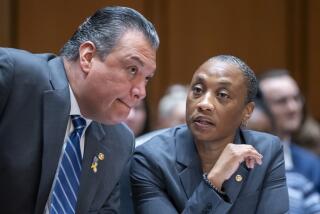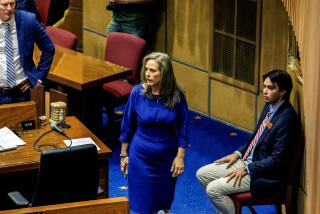NEWS ANALYSIS : Waxman and Berman Are Likely to Survive House’s Check Scandal
During their long political partnership, Reps. Henry A. Waxman (D-Los Angeles) and Howard L. Berman (D-Panorama City) have fought many battles together.
Now, caught up in the check-overdraft scandal that has rocked the House of Representatives, they face a rear-guard battle to maintain their credibility and deflect criticism from political foes.
It was disclosed this week that the two prominent lawmakers were among 325 former and current members who wrote 24,097 overdrafts during a 39-month period ending Oct. 3 at the defunct House bank.
Waxman had 434 overdrafts, which he said totaled more than $100,000. Berman had 67 but declined to reveal the amounts of the checks or the overdrafts.
Neither of them was included on the original list of 22 check-writers deemed “abusers” by the House Ethics Committee. Indeed, Waxman’s and Berman’s names were among the last to become known; unlike many of their colleagues, the Los Angeles lawmakers had not previously acknowledged that they had written any checks with insufficient funds.
The check brouhaha places Waxman and Berman on uncomfortable new terrain. Although the Westside-San Fernando Valley political alliance that bears their names often has been embroiled in political controversy, it never has been touched by a whiff of scandal.
And, at the same time that Waxman and Berman announced their overdrafts, the issue has been highlighted statewide by their close political ally, Rep. Mel Levine (D-Santa Monica). Levine, seeking the Democratic nomination to succeed retiring Alan Cranston (D-Calif.) in the June 2 primary election, is airing television ads touting a spotless check-writing record.
Further heightening the irony, Levine’s ads were produced by his campaign team of Carl D’Agostino and Michael Berman--who is Howard’s brother and a highly valued political adviser to both Howard Berman and Waxman.
Lt. Gov. Leo T. McCarthy, one of Levine’s opponents in the primary and a longtime nemesis of the Bermans, wasted no time Friday calling upon Levine to either denounce Waxman, Berman and other congressional contributors to Levine’s campaign who had overdrafts, or stop running his ads.
“If he doesn’t have the courage and the independence to criticize his cronies when they do something wrong, then he has no business running ads which refer to the scandal and which claim he has courage or independence,” said Roy Behr, McCarthy’s campaign manager.
Levine’s campaign responded that the ads are intended to show that Levine did not write bad checks--not attack those who did. Levine has no plans to suspend the ads nor to criticize Waxman and Berman.
In contrast to many of their colleagues--including some who wrote far fewer overdrafts--Waxman and Berman still appear headed for reelection in November. Berman is running in a new 26th District in the Northeast San Fernando Valley, Waxman in a new 29th District that is based on the Westside but extends into the southern Valley.
Both districts are safely Democratic. Moreover, the lawmakers have enormous campaign funds, widespread recognition and loyal support built up over a quarter-century in public life. Hence, no serious opponents emerged before last month’s filing deadline--which, not incidentally, fell before Waxman and Berman announced that they had any overdrafts.
“They’re both very popular,” said Rep. Vic Fazio (D-West Sacramento), a political ally who tracks House races nationwide as chairman of the Democratic Congressional Campaign Committee. “These guys have earned the right to make their case, and I think they’ll be able to do it far more than some who don’t have the resource of goodwill.”
Allan Hoffenblum, a California Republican consultant, concurred: “Henry Waxman is not just another member of Congress.” He said Waxman’s longtime backers will say: “Henry Waxman may have done something bad, but he’s one of ours.”
Paul Clarke, a Northridge Republican consultant, said that Waxman and Berman are unlikely to face congressional opponents with the financial resources to keep the issue alive.
But he added that, in the long term, “there’s no doubt that it hurts. The public has picked up on this check business as just another straw that broke the camel’s back as to congressional arrogance. So, they won’t forget.”
Opponents would be expected to seek to use this against them if either veteran representative should seek an office outside of Congress. Berman has been rumored to be considering the 1993 Los Angeles mayoral race, but he insists he has no such plans.
The other area where negative reaction could hurt is fund raising--one of the keys to Waxman-Berman’s success. Not only do they raise large sums to discourage serious election challenges, but they also dispense hundreds of thousands of dollars to other liberal candidates throughout the state and country who tend to remember the support once in office.
Marc Nathanson, chief executive of Falcon Holding Group, a Westwood-based cable television company and a longtime Waxman-Berman fund-raiser, said that Waxman and Berman each called him to explain their check records before they were made public.
“As far as I’m concerned, it has no impact,” Nathanson said. “I’m sure if I was in a club and everybody was doing something, I’d do it too, even though in hindsight I knew it was wrong.”
He added: “I think my reaction is likely to be typical of people who really know the important legislation that Henry has done, for example, in health care, AIDS and that whole energy field, and Howard has done in foreign affairs and immigration and Israel.”
Waxman has $851,920 in his campaign fund and Berman has $330,262, according to campaign reports filed this week.
Waxman’s and Berman’s reactions this week reflected the volatile nature of the issue with an electorate that appears outraged with incumbents in general and Congress in particular.
B oth said they had merely fol lowed well-established House rules providing members with “overdraft protection.” Berman noted that no taxpayer funds were lost through the overdrafts. Nonetheless, each expressed remorse that he had used the privilege.
“I deeply regret that I utilized free overdraft protection,” Berman said. “In hindsight, it is all too clear that this was nothing more or less than special treatment for members of Congress that could neither be justified nor withstand public scrutiny.”
In October, in response to a question about whether he had “bounced” any checks, Berman had said he had not done so, though he also noted that the bank did not “bounce” any checks. (It turned out that it did so but only in rare instances involving repeated abuse). Berman reiterated this week: “I have no bounced checks.”
Berman said that 28 of his 67 overdrafts “were either covered by deposits made on the same day, which the bank failed to post, or arrived on the last day of the month when the law states, and we were led to believe, we were being paid.”
Acting Ethics Committee Chairman Matthew F. McHugh (D-N.Y.) said Thursday that the bank’s “actual and longtime practice” was to post salary deposits on the first business day of the month even though the law said that “members are entitled to be paid at the end of each month.”
Berman said that his overdraft totals never exceeded his monthly paycheck. He refused, however, to disclose the size of his checks or the sum of the overdrafts.
“It’s all I will have to say on the subject,” Berman said of the three-paragraph statement he issued as the Ethics Committee released its list Thursday. “Otherwise there’s no end to this nonsense, and I’d rather focus on the issues that Congress should be . . . dealing with.”
Waxman, who had said that his checking record was a private matter, said his overdrafts exceeded his next paycheck on five of the 39 months reviewed but never for more than four business days. “No negative balance for these sums extended from one month to the next,” he added. He, too, said he had no checks that were bounced.
Times staff writer Tracy Wilkinson in Los Angeles contributed to this story.
More to Read
Get the L.A. Times Politics newsletter
Deeply reported insights into legislation, politics and policy from Sacramento, Washington and beyond. In your inbox three times per week.
You may occasionally receive promotional content from the Los Angeles Times.






